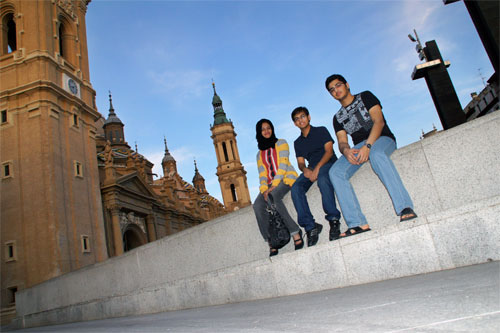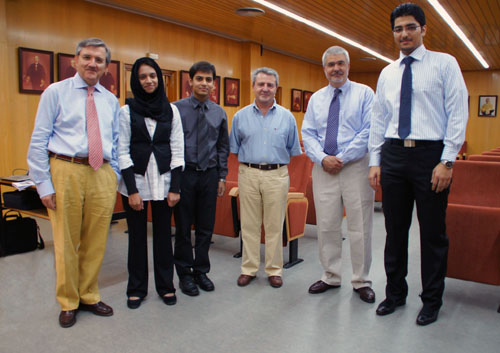WCMC-Q Student Researchers Impress at Bioethics Conference in Spain
September 2010

Second year medical students Sanah Sadiq and Arnab Chowdhury
and first year medical student Abdulhadi Al Saei in Spain for
the 2010 Bioethics Teaching and Research Methods at the
University of Zargoza.
Hard work can pay off in big ways. Three WCMC-Q students recently learned this first hand when their research on Down Syndrome in Qatar was accepted for presentation at a prestigious bioethics conference in Spain.
"This study is important, and it all started as an anecdote," says Dr. Pablo Rodriguez del Pozo, associate professor of public health at WCMC-Q and faculty lead of the study. "The students saw that people were staring at a child with Down Syndrome and that people were avoiding them in shopping checkout lines. And they said ‘wow, what is this? And have you noticed that you rarely see children with Down Syndrome in public?’"
Backed by funding from the Qatar National Research Fund’s Undergraduate Research Experience Program (UREP), second year medical students Sanah Sadiq and Arnab Chowdhury and first year medical student Abdulhadi Al Saei worked with Dr. del Pozo to develop a research study on the issue. They interviewed more than 50 families containing one member with Down Syndrome and 250 residents throughout Doha—sample sizes Dr. del Pozo says are ample to represent the population.
Their findings, which were presented in September at the V Summer Course on Bioethics Teaching and Research Methods at the University of Zargoza in Spain, show that people in Qatar are generally aware of the cause of Down Syndrome. Yet the students also learned from their interviews that many believe those with the condition will misbehave and are unfit to lead independent lives.
"Awareness of different social factors related to Down Syndrome was way less than we expected," says Al Saei, "Schools teach about this, but not enough."
Dr. del Pozo says that the study’s findings illuminate ways that more education around Down Syndrome in Qatar could help integrate people with the condition into public life.

Conference director Dr. Rogelio Altisent, University of Zaragoza
professor of bioethics, Sadiq, Chowdhury, Dr. Javier Castillo Garcia,
dean of the University of Zaragoza Medical College , Dr. Pablo
Rodriguez del Pozo, WCMC-Q associate professor of public health, and
Al Saei pose for a photo at the conference.
"Sometimes people disregard social studies thinking they are not medical studies," he says. "I think that it’s important for faculty and students to remember that medicine is not only about molecules and the cells but is also about society and what is going on ‘out there.’"
The student researchers all said they are inspired by their experience with social research and would like to participate in more such studies in the future.
"I am really glad to have had this opportunity thanks to the UREP funding,” Sadiq says. "I got involved with people, worked with scientific data, and I feel like I’ve done something good."
In the end, Dr. del Pozo says, research is about disseminating the results, and in that respect, the WCMC-Q student researchers made a strong and positive impression, internationally.
"We received lots of compliments—not just ‘good job,’ but more than a couple of times people presenting after us said ‘and this is what Pablo’s students were saying the other day.’"
Down Syndrome occurs when extra genetic material—specifically an extra, 21st, chromosome—is present in the cells. Earlier research lead by Cornell faculty shows that the incidence rate is the same in Qatar as the worldwide average.
By Emily Alp
